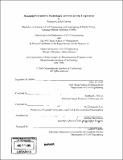| dc.contributor.advisor | Stephen C. Graves and David Simchi-Levi. | en_US |
| dc.contributor.author | Fearing, Rebecca Cassler | en_US |
| dc.contributor.other | Leaders for Manufacturing Program. | en_US |
| dc.date.accessioned | 2007-04-03T17:15:49Z | |
| dc.date.available | 2007-04-03T17:15:49Z | |
| dc.date.copyright | 2006 | en_US |
| dc.date.issued | 2006 | en_US |
| dc.identifier.uri | http://hdl.handle.net/1721.1/37138 | |
| dc.description | Thesis (S.M.)--Massachusetts Institute of Technology, Dept. of Civil and Environmental Engineering; and, (M.B.A.)--Massachusetts Institute of Technology, Sloan School of Management; in conjunction with the Leaders for Manufacturing Program at MIT, 2006. | en_US |
| dc.description | Includes bibliographical references (leaf 51). | en_US |
| dc.description.abstract | The work for this thesis was completed at Intel Corporation in Colorado Springs, Colorado at Fab 23, a semiconductor fabrication facility making flash memory. The project focused on evaluating and managing preventative maintenance activities to improve WIP (Work in Progress) management and cycle time. Equipment runs a factory, but effective maintenance of that equipment is often overlooked for improvement efforts due to constrained technical resources. However, preventative maintenance (PM) activities can provide process stability and increased throughput if scheduled and executed efficiently. This thesis evaluates the benefits of coordinating PMs among functional areas and the effectiveness of existing PM practices at a 24 hours per day, 7 days per week facility. Using a WIP model, I show that wait times can be significantly reduced by scheduling PMs on sequential tools at the same time, so WIP only waits once for PMs. Additionally, the goal of an effective maintenance team is to spend more scheduled time maintaining equipment and less time doing unscheduled repairs. A base line of PM performance at Fab 23 is completed showing that they have opportunities to improve their PM processes by learning from other Intel facilities and implementing off-line repairs. | en_US |
| dc.description.statementofresponsibility | by Rebecca Cassler Fearing. | en_US |
| dc.format.extent | 51 leaves | en_US |
| dc.language.iso | eng | en_US |
| dc.publisher | Massachusetts Institute of Technology | en_US |
| dc.rights | M.I.T. theses are protected by copyright. They may be viewed from this source for any purpose, but reproduction or distribution in any format is prohibited without written permission. See provided URL for inquiries about permission. | en_US |
| dc.rights.uri | http://dspace.mit.edu/handle/1721.1/7582 | |
| dc.subject | Civil and Environmental Engineering. | en_US |
| dc.subject | Sloan School of Management. | en_US |
| dc.subject | Leaders for Manufacturing Program. | en_US |
| dc.title | Managing preventative maintenance activities at Intel Corporation | en_US |
| dc.type | Thesis | en_US |
| dc.description.degree | M.B.A. | en_US |
| dc.description.degree | S.M. | en_US |
| dc.contributor.department | Leaders for Manufacturing Program at MIT | en_US |
| dc.contributor.department | Massachusetts Institute of Technology. Department of Civil and Environmental Engineering | |
| dc.contributor.department | Sloan School of Management | |
| dc.identifier.oclc | 85812848 | en_US |
